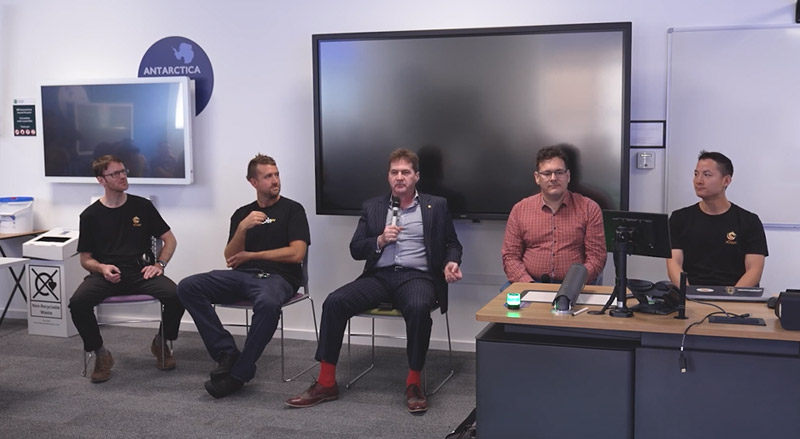sCrypt recently held a hackathon at the University of Exeter to educate students on how to develop blockchain applications leveraging the potential of the BSV blockchain. The hackathon included a panel discussion moderated by Jack Rogers, Senior Lecturer at the University of Exeter, was organised, which featured the main protagonists of the hackathon:
- Todd Price, Chief of Content at BSV Academy;
- Dr Craig S. Wright, Technical Advisor at nChain;
- Brendan Lee, Co-Founder of Elas;
- Xiaohui Liu, Founder and CEO of sCrypt.
The discussion served as an all-round discussion on the diverse topic of blockchain development and related topics such as regulation, entrepreneurship and finance. The conversation delved into various aspects of Bitcoin development, its potential applications, and the importance of coding efficiency.
Exploring the BSV blockchain’s potential
The panel started with the topic of potential use cases and applications for the BSV blockchain. Rogers asked the panel which applications they would like to see built on the BSV blockchain.
Wright emphasised the robustness and security of Bitcoin’s protocol, which stems from its transparency and openness to the public. Due to this, the BSV blockchain has the potential to innovate even high-security control systems, citing examples like managing nuclear power plants remotely, which are built on outdated systems due to security concerns.
Lee expressed anticipation for so-called killer applications leveraging the BSV blockchain’s properties in a novel way. Price stressed the need for identity-based systems and privacy-enhancing technologies. Liu highlighted the gap between BSV’s potential and current usage, urging for accessible development tools to spur innovation, which was also the main goal of the sCrypt hackathon.
Efficiency and optimisation in coding
Coding efficiency emerged as a central theme in the conversation, with the panellists sharing insights and anecdotes on the importance of streamlining code and avoiding unnecessary lines. Wright recounted Steve Wozniak’s experience at Apple, emphasising the value of refactoring code for improved performance.
Lee underscored the financial implications of code optimisation, highlighting its direct impact on cost savings for businesses. Liu cautioned the audience against writing negative lines of code as Steve Wozniak did in Wright’s example. In his experience this can lead to negative perceptions during performance reviews.
In this context, also the educational efforts of BSV Blockchain were discussed. Price highlighted the importance of standardising language and architecture in blockchain development. Collaboration and sharing of solutions among developers were emphasised as crucial for accelerating progress in the field. Price stressed the need for a mature repository of information to pass on to learners and encouraged collaboration to drive innovation forward.
Clarifying misconceptions and emphasising integrity
Wright clarified misconceptions surrounding Bitcoin’s protocol, emphasising its fixed nature and the importance of integrity in the blockchain network. A common misunderstanding r is the concept of decentralisation, which for Wright primarily consists of the fixed protocol of Bitcoin. He discussed practical considerations in achieving a fixed protocol, highlighting trade-offs in security and the enforcement of necessary rules.
Lee added that protocol changes can have devastating outcomes for businesses that build their products, contracts or applications on certain blockchains. A seemingly minor and insignificant change in the protocol can disable entire infrastructures.
Participate in the next sCrypt hackathon
Anyone interested in another sCrypt hackathon shortly will soon have the chance to take part in one in the USA. The hackathon will take place in San Francisco on March 16-17. You can find more information here.
